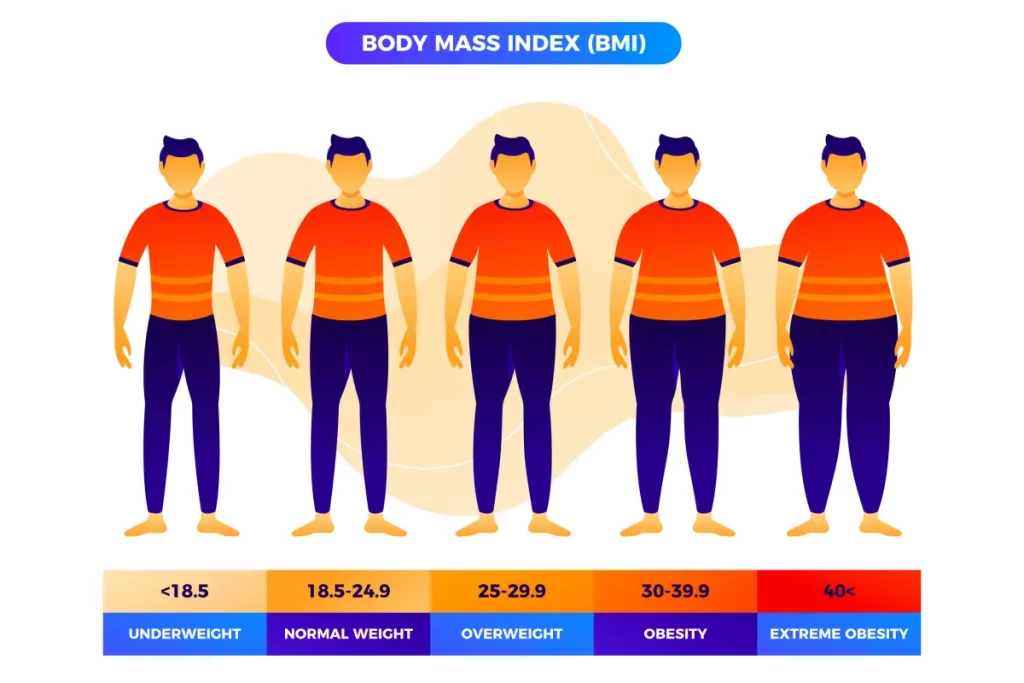Body mass index is a widely used measure to determine whether an individual has a healthy weight relative to his height. While not conclusive, BMI does serve its purpose as a dependable tool for assessing the risk associated with excess body fat.
This simple screening tool provides a framework for classifying individuals into categories such as underweight, normal weight, overweight, or obese based on their BMI values.

Table of Contents
BMI Classification
Here’s how BMI is generally interpreted for an adult aged 18 Years or older. Check from the below table if you fall within the ‘Normal Weight’ category or otherwise.
| BMI Value | Weight Classification |
|---|---|
| Below 18.5 | Underweight |
| 18.5 – 24.9 | Normal weight |
| 25.0 – 29.9 | Overweight |
| 30.0 – 39.9 | Obesity |
| 40.0 and above | Extreme Obesity |
How Can I Calculate My BMI?
Having learnt about the weight classification, a question might pop up in your mind; how can I calculate my BMI?
Well, the process is straightforward. You can easily determine your BMI using a simple formula. It involves dividing your weight in kilograms by the square of your height in meters.
Formula: BMI = weight (kg) / height (m)2
To illustrate, let’s calculate the BMI of an individual weighing 72 kilograms with 5 feet 8 inches (1.77 meters) height.
Here’s the calculation: When you divide the weight i.e. 72 kg. by the square of the height in meters i.e. (1.77 m)2, the result value comes to 23. Thus, the BMI of the individual in this example is 23 kg/m2.
BMI Calculator: It’s Easy To Check Your BMI
Calculate your BMI with this simple calculator. Follow the steps.
- Put appropriate value for your Weight in kg.
- Put appropriate value for your Height in cm.
- Press the button “Calculate BMI” and get your BMI.
BMI Calculator
Your BMI:
Recommended BMI for Asians
Dr. V Mohan of Chennai says, “Indian diabetologists unanimously agreed that the BMI cut-off for South Asians needed to be lower as we have more fat and less muscle in the same BMI category compared to westerners.”
The American Diabetes Association (ADA) has also said that the BMI cut-off for Asians, including Indians, should be 23 (as against 25 for others), since they developed diabetes at a higher rate, at earlier age, and at lower ranges of BMI than their white counterparts.
It’s been long advocated that for Indian population, the measurement of waist circumference (WC) should also be considered along with BMI. It is an as important parameter for Indians as BMI, if not more. Indians should start taking actions when their waist circumference reaches 35 inches (89 cm).
Health Risks Associated With Abnormal BMI
Understanding the implications of BMI is crucial for assessing our health status. Whether it is countering the risks of high BMI or navigating the complexities of being underweight, the impact on overall well-being is significant. Let's look deeper into the health risks associated with both high and low BMI levels.
Elevated BMI levels are linked to several health risks, including-
- Hypertension (blood pressure)
- Stroke (heart attack)
- Type-2 Diabetes
- Respiratory difficulties
- Sleep apnea
- Varicose veins
- Kidney and liver disorders
On the other hand, individuals with a BMI below 18.5 commonly encounter challenges such as-
- Malnutrition
- Vitamin deficiencies
- Hormonal imbalances
- Compromised immunity
BMI and cholesterol are intertwined in the context of overall health, particularly cardiovascular health. A high BMI, especially in the obese range, is often associated with elevated levels of LDL cholesterol ("bad" cholesterol) and triglycerides. These are risk factors for cardiovascular diseases like heart attacks and strokes.
Managing BMI through weight loss and adopting a heart-healthy diet can often lead to improvements in cholesterol levels. Medications may also be prescribed to control cholesterol, especially when lifestyle changes alone aren't sufficient. By controlling your BMI, you can significantly reduce the risk of heart disease and related complications; and lead a health life.
Conclusion
It's important to recognize that BMI alone doesn't account for various factors crucial to overall health, such as muscle mass, bone density, body composition, and fat distribution. Additionally, interpretations of BMI can vary depending on age, gender, and ethnicity.
For instance, individuals with substantial muscle mass, such as weight trainers or heavyweight boxers, may register a higher BMI despite being in good health. Conversely, adults of South Asian descent may be at increased risk of health conditions like diabetes, even with a BMI considered within the healthy range, such as 23.
While BMI is a useful starting point for assessing healthy weight, it's not the only factor to consider. Other measurements and factors such as waist circumference, body fat percentage, and overall lifestyle habits also play crucial roles in determining an individual's health status.




